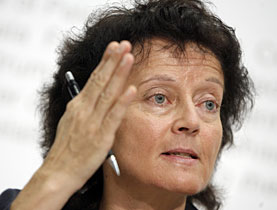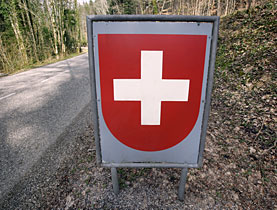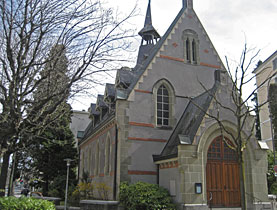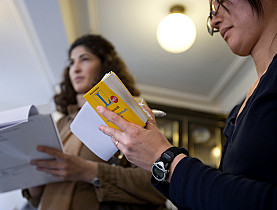Minister says Swiss economy needs foreign labour

The integration of foreigners is an opportunity for the Swiss economy, says Justice Minister Eveline Widmer-Schlumpf.
In an interview with swissinfo, she stresses how important the foreign workforce is and speaks about the government’s asylum policy.
Widmer-Schlumpf who is also acting finance minister, delivered Thursday’s opening address to a two-day meeting in Lucerne on the theme of Diversity and Integration.
swissinfo: As you mentioned in your speech to the conference in Lucerne, foreign workers make an important contribution to the prosperity of our country. Is integration a matter of our own self-interest?
Eveline Widmer-Schlumpf: One fifth of the resident population of Switzerland are foreigners. It is in the interest of the economy – also in view of demographic trends – that we should be able to draw on this labour pool.
It is also important that we should make use of the diversity in our country. We need to recognise that people with different backgrounds can make an important contribution to the development of society.
swissinfo: The government’s integration policy gives particular weight to mastering a national language. Is that enough?
E.W-S.: Language is not the means of integration, but it is the key to it. When you can communicate, when you can be understood, then you have a chance of feeling at ease in society – whether at work or in a sports association. Whether we like it or not, you need language for that.
swissinfo: What about foreign managers in the area of business, who often only speak English?
E.W-S.: That’s a question of integration too. A section of the population who cannot make themselves understood to the people around them thereby exclude themselves from the mainstream.
People generally talk about integration in connection with poorly qualified workers from third countries or from the Balkans, but in actual fact the integration of all groups of foreigners in Switzerland is an issue.
swissinfo: When do you consider a person to be integrated?
E.W-S.: When they are happy with our culture and philosophy, and are familiar with the way of life in the place where they live. When they know and accept our values and can make themselves understood. In other words, when the person can be regarded as part of the community.
swissinfo: Like your predecessor Christoph Blocher you are pursuing a tough asylum policy. But when it comes to the foreign labour force coming from the European Union, your position is extremely liberal. Isn’t there a danger of a double standard?
E.W-S.: Our asylum policy is not tough but it is consistent. We stick to the legal provisions.
Switzerland is a country with a humanitarian tradition, and we are sticking with that too. Given the high rate of acceptance of asylum seekers in Switzerland no one can say that Switzerland stands out as for being excessively tough. With over 25 per cent Switzerland is one of the countries with the highest acceptance rate.
I am convinced that we are acting fully in keeping with our humanitarian tradition. However, we want to be rigorous in combating abuse of any kind, because in the last resort that also harms people who have a well-founded claim to asylum.
As for the foreign work force, we need them. About a quarter of the hours worked in Switzerland are down to foreign manpower.
swissinfo: According to the NZZ am Sonntag newspaper you have proposed even tougher measures in a draft amendment of the law on asylum and foreigners.
E.W-S.: It’s not a matter of introducing tougher measures in the area of asylum, but of fleshing out and implementing the existing measures according to the law on asylum and foreigners. Some of the legal provisions are not specific enough.
swissinfo: The number of asylum applications has shot up in 2008, in particular because of the critical situation in Eritrea, Sri Lanka and Somalia. Should Eritrean deserters and draft dodgers still be sent back?
E.W-S.: The situation in Eritrea remains very tense. Applications for asylum are carefully checked case by case. If someone can show that they have grounds for asylum, that person will be recognised as a refugee. If there are no grounds for asylum, the next step is to check whether it would be reasonable, acceptable and possible to return them. This applies to all countries of origin.
So no one can say that we want to send basically all people from a particular country back, or alternatively that we will accept them all. Each case is examined individually. If a person who receives a negative decision to their asylum application cannot return to their home country, for example because there is a war going on there, they will be accepted temporarily.
swissinfo: Many countries have adopted specific measures to deal with the turbulent financial situation. So far you have mainly been downplaying it.
E.W-S.: We are not downplaying it. It is a fact that we have a strong economy, which is very well diversified. In the banking sector in particular we have a much more diverse structure than other countries do.
Of course we face problems, but we have also prepared measures to deal with them.
swissinfo: What are these measures exactly?
E.W-S.: These measures will be communicated once the cabinet has decided on them.
swissinfo-Interview: Corinne Buchser
The third international conference on Diversity/Integration – in state, economy and society took place in Lucerne on October 9-10.
It was organised by the Lucerne Initiative for Peace and Security (Lips).
The central topic was diversity management as a factor in success and an advantage in competition.
Diversity management describes to a business culture which exploits cultural diversity.
Between January and September 2008, 10,351 applications were made for asylum, 2,351 more than in the same period last year.
The most asylum seekers currently come from the following countries in descending order: Eritrea, Somalia, Serbia and Kosovo, Iraq, Sri Lanka and Nigeria.
The acceptance rate rose from 18.4% in the first nine months of 2007 to 25.2% in the same period of 2008.

In compliance with the JTI standards
More: SWI swissinfo.ch certified by the Journalism Trust Initiative



You can find an overview of ongoing debates with our journalists here. Please join us!
If you want to start a conversation about a topic raised in this article or want to report factual errors, email us at english@swissinfo.ch.